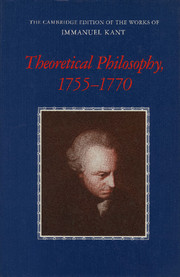Book contents
- Frontmatter
- Contents
- General editors' preface
- Preface
- Guide to abbreviations
- General introduction
- Introductions to the translations
- Résumés of the works
- A NEW ELUCIDATION OF THE FIRST PRINCIPLES OF METAPHYSICAL COGNITION (1755)
- Purpose of the undertaking
- Section 1 Concerning the principle of contradiction
- Section 2 Concerning the principle of the determining ground
- Section 3 Presentation of the two principles of metaphysical cognition
- THE EMPLOYMENT IN NATURAL PHILOSOPHY OF METAPHYSICS COMBINED WITH GEOMETRY, OF WHICH SAMPLE I CONTAINS THE PHYSICAL MONADOLOGY (1756)
- AN ATTEMPT AT SOME REFLECTIONS ON OPTIMISM (1759)
- THE FALSE SUBTLETY OF THE FOUR SYLLOGISTIC FIGURES (1762)
- THE ONLY POSSIBLE ARGUMENT IN SUPPORT OF A DEMONSTRATION OF THE EXISTENCE OF GOD (1763)
- ATTEMPT TO INTRODUCE THE CONCEPT OF NEGATIVE MAGNITUDES INTO PHILOSOPHY (1763)
- INQUIRY CONCERNING THE DISTINCTNESS OF THE PRINCIPLES OF NATURAL THEOLOGY AND MORALITY (1764)
- M. IMMANUEL KANT'S ANNOUNCEMENT OF THE PROGRAMME OF HIS LECTURES FOR THE WINTER SEMESTER 1765 — 1766 (1765)
- DREAMS OF A SPIRIT-SEER ELUCIDATED BY DREAMS OF METAPHYSICS (1766)
- CONCERNING THE ULTIMATE GROUND OF THE DIFFERENTIATION OF DIRECTIONS IN SPACE (1768)
- ON THE FORM AND PRINCIPLES OF THE SENSIBLE AND THE INTELLIGIBLE WORLD [INAUGURAL DISSERTATION] (1770)
- Factual notes
- Bibliographies of editions and translations
- Glossary
- Biographical-bibliographical sketches of persons mentioned by Kant
- Index
Purpose of the undertaking
Published online by Cambridge University Press: 18 December 2014
- Frontmatter
- Contents
- General editors' preface
- Preface
- Guide to abbreviations
- General introduction
- Introductions to the translations
- Résumés of the works
- A NEW ELUCIDATION OF THE FIRST PRINCIPLES OF METAPHYSICAL COGNITION (1755)
- Purpose of the undertaking
- Section 1 Concerning the principle of contradiction
- Section 2 Concerning the principle of the determining ground
- Section 3 Presentation of the two principles of metaphysical cognition
- THE EMPLOYMENT IN NATURAL PHILOSOPHY OF METAPHYSICS COMBINED WITH GEOMETRY, OF WHICH SAMPLE I CONTAINS THE PHYSICAL MONADOLOGY (1756)
- AN ATTEMPT AT SOME REFLECTIONS ON OPTIMISM (1759)
- THE FALSE SUBTLETY OF THE FOUR SYLLOGISTIC FIGURES (1762)
- THE ONLY POSSIBLE ARGUMENT IN SUPPORT OF A DEMONSTRATION OF THE EXISTENCE OF GOD (1763)
- ATTEMPT TO INTRODUCE THE CONCEPT OF NEGATIVE MAGNITUDES INTO PHILOSOPHY (1763)
- INQUIRY CONCERNING THE DISTINCTNESS OF THE PRINCIPLES OF NATURAL THEOLOGY AND MORALITY (1764)
- M. IMMANUEL KANT'S ANNOUNCEMENT OF THE PROGRAMME OF HIS LECTURES FOR THE WINTER SEMESTER 1765 — 1766 (1765)
- DREAMS OF A SPIRIT-SEER ELUCIDATED BY DREAMS OF METAPHYSICS (1766)
- CONCERNING THE ULTIMATE GROUND OF THE DIFFERENTIATION OF DIRECTIONS IN SPACE (1768)
- ON THE FORM AND PRINCIPLES OF THE SENSIBLE AND THE INTELLIGIBLE WORLD [INAUGURAL DISSERTATION] (1770)
- Factual notes
- Bibliographies of editions and translations
- Glossary
- Biographical-bibliographical sketches of persons mentioned by Kant
- Index
Summary
I am about to throw some light, I hope, on the first principles of our cognition, and to expound in as few pages as possible the product of my reflection on the subject. I have thus carefully avoided extensive digressions and only laid bare the muscles and joints of my argument, having put aside all charm and grace of language, like a discarded garment. If I shall anywhere in this undertaking have considered it my duty to dissent from the opinions of celebrated men, and even on occasion to mention them by name, I am so well persuaded of their fair-mindedness that I am confident that my dissent will in no wise detract from the honour which their merits deserve, or that they will in any way resent my criticism. When opinions diverge, each is fully entitled to his own view. Nor is it forbidden to criticise the arguments of others in a modest and balanced fashion, provided that the criticism is free from bitterness and contentiousness. Nor have I ever noticed that impartial judges have deemed such criticism to be contrary to the requirements of either politeness or respect.
Accordingly, I shall, in the first place, attempt to weigh on the scales of a more carefully conducted enquiry the things which are asserted, usually with more confidence than truth, concerning the supreme and undoubted primacy of the principle of contradiction over all truths. I shall then attempt briefly to explain what ought more correctly to be maintained on this head. I shall therupon adduce, in what concerns the law of sufficient reason, whatever may serve to improve both an understanding and the proof of that principle. At the same time, I shall cite the difficulties which seem to beset it, replying to them with all the force of argument at the disposal of my modest mind.
- Type
- Chapter
- Information
- Publisher: Cambridge University PressPrint publication year: 1992



